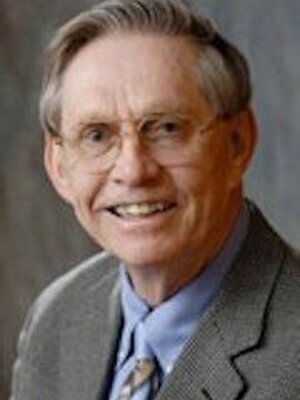
by Frederick Lamb
August 22, 2016
It is with great sadness that I report the passing of Jeremiah D. Sullivan, one of the early leaders of ACDIS and a dear friend and colleague. Jeremiah died peacefully at home on July 7, after a long illness. He superbly combined an intense interest in fundamental physics with a deep and life-long commitment to making the world a better and safer place. A Professor of Physics at the University of Illinois, he served as Director of the ACDIS Program from 1986 to 1994 and as Head of the Physics Department from 2000 to 2006.
Jeremiah earned a bachelor’s degree in physics from the Carnegie Institute of Technology (now Carnegie Mellon University) in 1960, and an M.A. and Ph.D. in physics from Princeton University in 1964. From 1964 to 1967 he was a research associate in the theoretical physics group at the Stanford Linear Accelerator Center (SLAC) and he was appointed an acting assistant professor of physics at Stanford University in 1966–1967. He moved to the University of Illinois in 1967 and advanced rapidly through the academic ranks to become a professor of physics in 1973.
During this period Jeremiah made significant contributions to particle physics, elucidating high-energy electromagnetic interactions, the Drell–Yan process, and other hadron-hadron processes at high energies. His work on these problems earned him an international reputation and led to his selection for influential positions, including membership on the U.S. Department of Energy’s High Energy Physics Advisory Panel and acting head of the Theoretical Physics Division at the Fermi National Accelerator Laboratory in 1972 (on leave from the University of Illinois).
In the mid-1970s, Jeremiah became increasingly interested in national and international security questions, and these gradually became the main focus of his career. In 1974 he accepted an invitation to become a member of JASON, a group of experts who provide technical analyses to the U.S. government on scientific issues relevant to national security. Jeremiah was particularly interested in civilian and military uses of space, safe and secure dismantlement of nuclear weapons and disposition of fissile materials, technologies for enhancing the effectiveness of peace operations, arms control verification, and science and public policy.
In 1982, I invited Jeremiah and eleven other faculty members to join me in my effort to create a physics course on nuclear weapons, nuclear war, and arms control. Jeremiah taught the course several times during the next two decades and helped develop it further. This course continues to be taught annually by the physics department and is thought to be the longest-running course of its kind.
In 1986, Jeremiah became the first paid, part-time Director of the ACDIS program. During the next eight years, he helped expand the education and outreach aspects of the program and helped support the creation of the War in History program and more than two dozen graduate and undergraduate courses on topics related to national and international security and arms control.
In the early 1990s, I invited Jeremiah to join my ongoing research program on technical aspects of the verification of nuclear test ban treaties and had the great pleasure of having him work closely with me on these questions for several years.
Jeremiah played a leading role in the 1995 Department of Energy sponsored study that led to the United States’ signing the Comprehensive Test Ban Treaty in 1996.
Jeremiah served on many U.S. government agency and laboratory advisory committees, including the Advisory Committee of the National Nuclear Security Administration, the External Advisory Committee on Arms Control and National Security of Sandia National Laboratories, the External Review Committee of the Nonproliferation, Arms Control, and International Security Directorate of Lawrence Livermore National Laboratory, and the Review Committee of the National Security Directorate of Pacific Northwest National Laboratory. During 2001–2005 he was the U.S. representative to the NATO Science Committee’s Panel on Security-Related Civil Science and Technology.
Jeremiah also gave his time and advice to many non-governmental organizations, including the Committee on International Security and Arms Control of the National Academy of Sciences, the Committee on National Security and Arms Control of the American Academy of Arts and Sciences, the American Physical Society’s Panel on Public Affairs, and the Board of Directors of the Arms Control Association. He served on the American Physical Society’s 1985–87 Study Panel on Directed Energy Weapons.
Jeremiah received an Alfred P. Sloan Foundation Research Fellowship for his work in high energy physics and was elected to fellowship in the American Physical Society and the American Association for the Advancement of Science. In 2000, the American Physical Society gave him its Leo Szilard Award “for leadership in addressing technically complex and often controversial national security issues such as anti-ballistic missiles, stockpile stewardship, and a comprehensive test ban; and for setting a high standard for applying the rigorous methods of physics to the challenging problems of integrating advanced technology with a sound policy in a democratic society”.
Jeremiah was unfailingly courteous, kind, and humane, and was treasured by his friends and colleagues for his honesty, fairness, open-mindedness, and humanity. He will be sorely missed.
_________________
ACDIS thanks Frederick Lamb for this contribution. Dr. Lamb is a core faculty member in the ACDIS Program, a Research Professor of Physics, and Emeritus Professor of Physics and Astronomy and Emeritus Brand and Monica Fortner Chaired Professor of Theoretical Astrophysics at the University of Illinois at Urbana-Champaign.